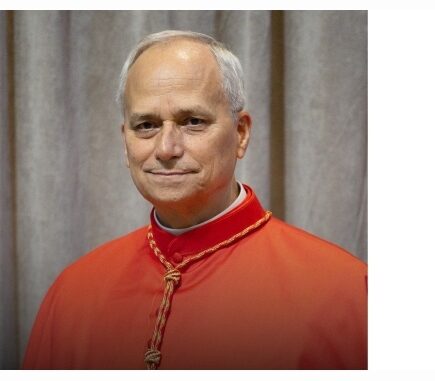
Cardinal Robert Francis Prevost, born September 14, 1955, in Chicago, Illinois, was elected the first American pope in the 2,000-year history of the Catholic Church on May 8, 2025, taking the papal name Leo XIV. A member of the Order of Saint Augustine (O.S.A.), Prevost’s career spans decades of missionary work, pastoral leadership, and high-level Vatican administration, marked by his extensive service in Peru and his role as prefect of the Dicastery for Bishops.
Early Life and Education
Prevost was raised in a devout Catholic family of French, Italian, and Spanish descent. His mother, Mildred Martínez, was known for hosting priests at their Chicago home, and his father, Louis Marius Prevost, served as a catechist. Prevost attended a parish school, served as an altar boy, and discerned a priestly vocation early on. He earned a Bachelor of Science in Mathematics from Villanova University in 1977, a Master of Divinity from Catholic Theological Union in Chicago in 1982, and both a licentiate (1984) and doctorate (1987) in canon law from the Pontifical College of St. Thomas Aquinas in Rome. His doctoral thesis focused on the role of the local prior in the Augustinian order.
Religious and Priestly Career
Prevost joined the Augustinian novitiate in 1977, taking solemn vows in 1981 and being ordained a priest in Rome on June 19, 1982. His early assignments included:
- Peru (1985–1986, 1988–1998): Sent to the Augustinian mission in Peru, Prevost served as a parish pastor, diocesan official, seminary teacher, and judicial vicar in the Territorial Prelature of Chulucanas and the Archdiocese of Trujillo. He founded a parish and taught canon law, patristics, and morals. He became a naturalized Peruvian citizen, reflecting his deep connection to the country.
- Chicago (1999–2001): Elected provincial of the Augustinian Province of Chicago, he oversaw the Midwest region of the order.
- Prior General of the Augustinians (2001–2013): Elected to two consecutive six-year terms as prior general, Prevost led the global Augustinian order from Rome, visiting nearly 50 countries and gaining international experience.
Episcopal and Vatican Roles
Prevost’s rise in the Church hierarchy included significant appointments:
- Bishop of Chiclayo, Peru (2014–2023): Appointed apostolic administrator in 2014 and bishop in 2015, he served in northern Peru, overseeing urban and rural communities. He was also active in the Peruvian Episcopal Conference, serving as the first president of the Episcopal Commission for the Protection of Minors and Vulnerable Adults and contributing to guidelines for handling clergy abuse cases.
- Dicastery for Bishops (2020–2023): Named a member in 2020, Prevost was appointed prefect in January 2023, succeeding Cardinal Marc Ouellet. As prefect, he advised Pope Francis on bishop appointments worldwide, a role that elevated his global influence. He also served as president of the Pontifical Commission for Latin America.
- Cardinal (2023): Pope Francis elevated Prevost to cardinal on September 30, 2023, and in February 2025 inducted him into the order of Cardinal Bishops, a sign of significant trust. He was also a member of seven Vatican dicasteries and the Commission for the Governance of Vatican City State.
Papal Election and Profile
Elected on the second day of the 2025 conclave, Prevost, at 69, emerged as a compromise candidate, balancing pastoral experience with curial expertise. His supporters highlighted his moderation, listening skills, and alignment with Pope Francis’s priorities, including synodality, outreach to the marginalized, and environmental concerns. His dual U.S.-Peruvian citizenship and decades in Latin America mitigated concerns about an American “superpower pope,” while his global experience made him a “cosmopolitan” figure. Italian media described him as “the least American of the Americans” for his reserved demeanor and lack of stereotypical American traits.
Prevost is known for emphasizing pastoral leadership over doctrinal rigidity, stating in a 2023 Vatican News interview, “We are often worried about teaching doctrine, but we risk forgetting that our first duty is to communicate the beauty and joy of knowing Jesus.” He advocated for bishops to be close to their people, rejecting isolated or authoritarian models of authority.
Controversies
Prevost’s handling of clergy sexual abuse cases has drawn scrutiny:
- Chicago (2000): As provincial, he permitted Father James Ray, an Augustinian priest convicted of sexual abuse, to reside at St. John Stone Friary near a Catholic elementary school. Ray was monitored but not immediately removed, and Prevost did not notify the school. Ray was later moved in 2002 and laicized in 2012. Critics, including SNAP, argue Prevost failed to act decisively. His supporters claim he followed Church procedures and that the case was misrepresented.
- Peru (2022): Three women alleged Prevost failed to investigate abuse claims against two priests in Chiclayo. The diocese denied this, stating Prevost met with victims, suspended the priest, and forwarded the case to the Vatican, which found insufficient evidence. Supporters argue the accusations were part of a smear campaign by a former Augustinian.
These controversies raised concerns among abuse advocates, but some cardinals reportedly viewed them as weaponized attacks against a Francis-aligned candidate.
Personal Traits and Interests
Prevost is described as discreet, pragmatic, and a skilled listener, with a reputation for good humor and humility. He speaks Spanish and Italian fluently and is an amateur tennis player, though his Vatican roles left little time for practice. His multicultural background and global experience shape his pastoral approach, emphasizing service and closeness to the faithful.
Significance as Pope Leo XIV
As the first American pope, Prevost’s election breaks a historical taboo, reflecting a shift in the College of Cardinals’ priorities away from geopolitical concerns. His papacy is expected to continue Pope Francis’s focus on synodality, social justice, and pastoral outreach, with a more cautious and administrative style. At 69, he is seen as having the potential for a stable, decade-long reign.
Leave a Reply